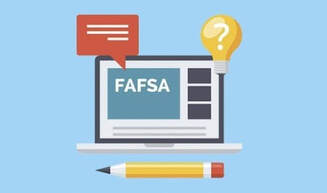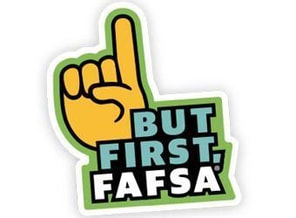 By: Claudia Belmonte*
These questions are intended to spark conversations about the FAFSA completion process, as well as the role of educators, guidance counselors, and others who provide student support. FAFSA, or Free Application for Federal Student Aid, is an official form filled out by students and families to determine financial assistance eligibility for college from the federal government. FAFSA provides both need based and non-need based aid to students who apply. Financial official documents are needed to fill out the FAFSA, like bank statements, social security cards, W2s and tax returns. Students and families should create a Federal Student Aid ID and select their desired year for aid receival. For typical applicants, FAFSA must be completed within the window of the October-June before the intended fall semester begins. The FAFSA has seven sections, which include Student Demographics, School Selection, Dependency Status, Parent(s) Demographics, Financial Information, Sign and Submit, and Confirmation (of completion). Once the FAFSA is completed, students await their Student Aid Report (SAR). The SAR determines their families Estimated Family Contribution (EFC) which is an estimate of a family’s ability to pay the costs of a year of college.  Regardless of the process being rather organized, a plethora of students still do not fill out the FAFSA due to misconceptions about it. In 2018 alone, the Class of 2018 missed out on $2.6 billion in Pell grants, which is a need-based federal aid that does not have to be repaid (2019). When investigated, the most common student explanations included that they believed their families were ineligible for aid (without trying), they did not want to take on debt (which is not always the case), they did not have enough information about how to complete the FAFSA, and they believed that filling out FAFSA forms took too much time work. Lastly, and most importantly, many students and their families did not fill out the FAFSA because they lacked the knowledge and professional assistance needed to complete it. That being said, it is important to close that gap as educators, guidance counselors, and other student supporters. Some students' ability to attend college is solely dependent on application for FAFSA, and may never receive aid due to an off-putting application process and lack of assistance. Educators need to highlight that this opportunity exists, and provide necessary support to students. At the very least, it is important that educators, guidance counselors and other student supporters inform their students about opportunities that completing the FAFSA provides. But, doing so in combination with providing application support could make all the difference. So you may be wondering: what can you do? The answer is providing more support in whatever form may be feasible or needed for your given school, whether that means engaging in email or text based outreach to remind students/families about FAFSA deadlines, or training volunteers to serve as advisors for families through the FAFSA application process. The smallest actions of support can make a huge difference in the futures of students. The Fordham PDRC is offering training to Guidance Counselors and Student Support Staff with the objective to give them the necessary information on how to complete each of the steps of the FAFSA Application. Please refer to the Upcoming Events section at the end of the newsletter. In addition, the NYC Regional Bilingual Education Network at Fordham University offers training that is specifically designed to support English Language Learners and their parents. For additional information, please contact the Fordham NYC RBE-RN at [email protected]. * Claudia Belmonte is Fordham Graduate Student doing her internship with the PDRC at the Center for Educational Partnerships. She can be reached at: [email protected].
0 Comments
|
Archives
January 2024
Categories
All
|
